The Best Obd2 Scanner can unlock the hidden data of your car, connecting to its computer and giving you access to the information it holds, and CAR-TOOL.EDU.VN will show you how. Whether there’s a vehicle issue or a dashboard light, the computer usually knows. The OBD2 scanner acts as the intermediary, letting you diagnose the problem yourself without paying a professional.
Contents
- 1. What Are The Top 5 Best OBD2 Scanner Search Intentions?
- 2. What Is An OBD2 Scanner, And Why Do You Need One?
- 2.1 Understanding The Basics Of OBD2 Scanners
- 2.2 Who Benefits From Using An OBD2 Scanner?
- 2.3 The Advantages Of Having An OBD2 Scanner
- 3. What Key Features Should You Look For In The Best OBD2 Scanner?
- 3.1 Compatibility With Your Vehicle
- 3.2 Ease Of Use And Interface
- 3.3 Code Reading And Interpretation
- 3.4 Live Data Streaming
- 3.5 Bi-Directional Control
- 3.6 Update And Support
- 4. What Are The Top OBD2 Scanner Brands And Models In The Market?
- 4.1 Topdon Topscan: Best Mobile OBD2 Scanner
- 4.1.1 Key Features Of The Topdon Topscan
- 4.1.2 Pros And Cons Of The Topdon Topscan
- 4.2 Launch Cr529: Best Cheap OBD2 Scanner
- 4.2.1 Key Features Of The Launch Cr529
- 4.2.2 Pros And Cons Of The Launch Cr529
- 4.3 Topdon Phoenix Lite 2: Best Pro-Level OBD2 Scanner
- 4.3.1 Key Features Of The Topdon Phoenix Lite 2
- 4.3.2 Pros And Cons Of The Topdon Phoenix Lite 2
- 4.4 Ancel Bd310: Best Dual-Purpose OBD2 Scanner
- 4.4.1 Key Features Of The Ancel Bd310
- 4.4.2 Pros And Cons Of The Ancel Bd310
- 4.5 Carly OBD-II Scanner: Best Scanner With A Companion App
- 4.5.1 Key Features Of The Carly OBD-II Scanner
- 4.5.2 Pros and Cons of the Carly OBD-II Scanner
- 4.6 Innova Carscan Mobile 1000: An Innovative Bluetooth Option
- 4.6.1 Key Features Of The Innova Carscan Mobile 1000
- 4.6.2 Pros and Cons of the Innova Carscan Mobile 1000
- 4.7 Thinkcar Thinkdiag Tkd01: Robust Bluetooth Scanner
- 4.7.1 Key Features Of The Thinkcar Thinkdiag Tkd01
- 4.7.2 Pros and Cons of the Thinkcar Thinkdiag Tkd01
- 4.8 Autel Autolink Al539: Best For Electrical Diagnostics
- 4.8.1 Key Features Of The Autel Autolink Al539
- 4.8.2 Pros and Cons of the Autel Autolink Al539
- 5. How Do You Choose The Best OBD2 Scanner For Your Needs?
- 5.1 Determine Your Budget
- 5.2 Identify Your Needs
- 5.3 Read Reviews And Comparisons
- 5.4 Consider Long-Term Costs
- 5.5 Evaluate Ease Of Use
- 6. How Do OBD2 Scanners Work?
- 6.1 Connecting The Scanner To Your Vehicle
- 6.2 Reading And Interpreting Diagnostic Codes
- 6.3 Understanding Live Data Streams
- 6.4 Clearing Diagnostic Codes
- 7. What Are Diagnostic Trouble Codes (Dtcs) And What Do They Mean?
- 7.1 Standardized Vs. Manufacturer-Specific Codes
- 7.2 Decoding Common Dtcs
- 7.3 Using Dtc Lookup Resources
- 8. How Do You Maintain And Update Your OBD2 Scanner?
- 8.1 Keeping Your Scanner Clean And Dry
- 8.2 Storing Your Scanner Properly
- 8.3 Updating The Software Regularly
- 8.4 Checking For Firmware Updates
- 9. What Are Some Common Mistakes To Avoid When Using An OBD2 Scanner?
- 9.1 Ignoring Vehicle Compatibility
- 9.2 Misinterpreting Diagnostic Codes
- 9.3 Neglecting Live Data Analysis
- 9.4 Failing To Update The Scanner
- 9.5 Overlooking Basic Maintenance
- 10. Frequently Asked Questions (Faqs) About OBD2 Scanners
- 10.1 What Is An OBD-II Scanner?
- 10.2 What Is The OBD-II Port?
- 10.3 What Is A DTC?
- 10.4 What Do Dtcs Actually Mean?
- 10.5 Can An OBD2 Scanner Clear Check Engine Lights?
- 10.6 Are All OBD2 Scanners Compatible With All Vehicles?
- 10.7 Do I Need A Professional Mechanic To Use An OBD2 Scanner?
- 10.8 How Often Should I Use An OBD2 Scanner?
- 10.9 Can An OBD2 Scanner Improve Fuel Efficiency?
- 10.10 Where Can I Buy A Reliable OBD2 Scanner?
- Conclusion
Are you ready to find the perfect diagnostic tool for your needs? Let’s dive into the world of OBD2 scanners and discover the ideal device to keep your vehicle running smoothly. For expert advice on selecting the right OBD2 scanner and a wide range of automotive tools, contact us via Whatsapp at +1 (641) 206-8880 or visit our website at CAR-TOOL.EDU.VN. Our location is 456 Elm Street, Dallas, TX 75201, United States. Discover the future of automotive diagnostics with us today and enhance your vehicle maintenance experience.
1. What Are The Top 5 Best OBD2 Scanner Search Intentions?
Here are the top 5 search intentions related to the keyword “best OBD2 scanner”:
-
Finding the best OBD2 scanner for personal use: Users want a reliable and easy-to-use scanner to diagnose and fix common car issues themselves.
-
Identifying the best professional-grade OBD2 scanner: Mechanics and technicians need advanced scanners with comprehensive features for detailed diagnostics and repairs.
-
Comparing OBD2 scanners based on features and price: Users want to compare different models to find the best value for their specific needs.
-
Locating the best OBD2 scanner for specific car models: Car owners seek scanners that are fully compatible with their vehicle’s make and model.
-
Discovering the best Bluetooth OBD2 scanner: Users are interested in wireless scanners that connect to smartphones or tablets for convenient data display and analysis.
2. What Is An OBD2 Scanner, And Why Do You Need One?
An OBD2 scanner is a diagnostic tool that connects to your vehicle’s onboard computer system, retrieving valuable data about its performance and health. According to a study by the National Institute for Automotive Service Excellence (ASE), using an OBD2 scanner can reduce diagnostic time by up to 50%.
2.1 Understanding The Basics Of OBD2 Scanners
OBD2, which stands for On-Board Diagnostics II, is a standardized system used in most vehicles manufactured after 1996. These scanners read diagnostic trouble codes (DTCs), which indicate potential issues with the engine, transmission, and other critical systems.
2.2 Who Benefits From Using An OBD2 Scanner?
- DIY Car Owners: Save money on diagnostic fees and perform basic repairs yourself.
- Professional Mechanics: Quickly identify complex issues and improve diagnostic accuracy.
- Car Enthusiasts: Monitor vehicle performance and optimize settings for better efficiency.
2.3 The Advantages Of Having An OBD2 Scanner
- Cost Savings: Avoid expensive trips to the mechanic for simple diagnostics.
- Early Problem Detection: Identify potential issues before they become major repairs.
- Improved Vehicle Performance: Monitor and optimize your car’s performance for better fuel efficiency and power.
3. What Key Features Should You Look For In The Best OBD2 Scanner?
When selecting an OBD2 scanner, consider these key features to ensure it meets your needs and provides accurate, reliable diagnostics.
3.1 Compatibility With Your Vehicle
Ensure the scanner supports the make, model, and year of your vehicle. Many scanners offer broad compatibility, but some may have limitations.
3.2 Ease Of Use And Interface
Choose a scanner with an intuitive interface and easy-to-read display. This is particularly important for DIY users who may not have extensive technical knowledge.
3.3 Code Reading And Interpretation
The best OBD2 scanners not only read diagnostic codes but also provide detailed explanations of what the codes mean. This helps you understand the problem and determine the appropriate solution.
3.4 Live Data Streaming
Live data streaming allows you to monitor real-time performance metrics such as engine speed, coolant temperature, and oxygen sensor readings. This is essential for diagnosing intermittent issues and optimizing vehicle performance.
3.5 Bi-Directional Control
Bi-directional control enables you to send commands to your vehicle’s computer system to test specific components and functions. This feature is typically found in more advanced scanners and is invaluable for professional mechanics.
3.6 Update And Support
Ensure the scanner offers regular software updates to support new vehicle models and diagnostic codes. Reliable customer support is also crucial in case you encounter any issues or need assistance.
4. What Are The Top OBD2 Scanner Brands And Models In The Market?
Several reputable brands offer high-quality OBD2 scanners. Here are some of the top brands and models to consider:
4.1 Topdon Topscan: Best Mobile OBD2 Scanner
The Topdon Topscan is a compact Bluetooth scanner that offers a range of professional-grade features. It excels in automotive diagnostics, live data streaming, and performance checks.
4.1.1 Key Features Of The Topdon Topscan
- Excellent coverage of automotive diagnostics
- Live data streaming
- Unique performance indicators
- Maintenance items covered
4.1.2 Pros And Cons Of The Topdon Topscan
Pros:
- Easy to set up
- Compact design
- Comprehensive diagnostic capabilities
Cons:
- The transmitter is big and heavy
- Some features require a subscription after a year
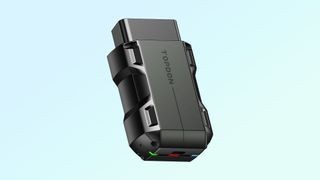 Topdon Topscan OBD Scanner With Bluetooth
Topdon Topscan OBD Scanner With Bluetooth
4.2 Launch Cr529: Best Cheap OBD2 Scanner
The Launch CR529 is a small, powerful scanner that offers essential OBD2 functions at an affordable price. It is ideal for DIY users who need a reliable tool for basic diagnostics.
4.2.1 Key Features Of The Launch Cr529
- Inexpensive
- Lifetime updates
- Easy pre-inspection report
4.2.2 Pros And Cons Of The Launch Cr529
Pros:
- Affordable
- Lifetime updates
- User-friendly interface
Cons:
- Lacks manufacturer specialty codes
- Feels heavy in hand
- 1-year warranty
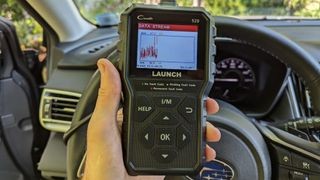 Launch Cr259 OBD-II Scanner
Launch Cr259 OBD-II Scanner
4.3 Topdon Phoenix Lite 2: Best Pro-Level OBD2 Scanner
The Topdon Phoenix Lite 2 is a high-end scanner designed for professional mechanics and serious car enthusiasts. It offers advanced diagnostic features, bi-directional control, and comprehensive vehicle coverage.
4.3.1 Key Features Of The Topdon Phoenix Lite 2
- Near professional OBD scanner
- Hybrid handheld with Wi-Fi and Bluetooth
- 8-inch touch screen
- Excellent array of diagnostic tests and live data
- Includes adapters and a hard case
4.3.2 Pros And Cons Of The Topdon Phoenix Lite 2
Pros:
- Wireless connectivity
- Rugged design
- Advanced diagnostic features
Cons:
- Expensive
- Bulky and heavy
- Requires a subscription after two years for updates
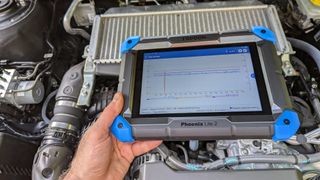 Topdon Phoenix Lite 2 OBD2 Scanner Over Car Engine
Topdon Phoenix Lite 2 OBD2 Scanner Over Car Engine
4.4 Ancel Bd310: Best Dual-Purpose OBD2 Scanner
The Ancel BD310 is a versatile scanner that can function as both a handheld device and a secondary car display. It offers a range of engine specs and is compatible with smartphones via Bluetooth.
4.4.1 Key Features Of The Ancel Bd310
- Light and compact
- Works as a scanner and secondary car display
- Offers handheld and Bluetooth scanning capabilities
4.4.2 Pros And Cons Of The Ancel Bd310
Pros:
- Compact and portable
- Dual-purpose functionality
- Easy to use
Cons:
- Minimalist interface
- Small screen
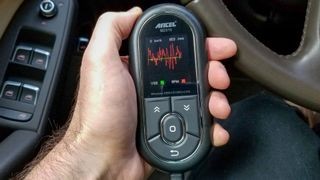 Best OBD-II Scanners: Ancel BD310
Best OBD-II Scanners: Ancel BD310
4.5 Carly OBD-II Scanner: Best Scanner With A Companion App
The Carly OBD-II Scanner stands out with its exceptional companion app, offering customization options and professional-level tests. Ideal for VW, BMW, and Ford cars, it provides extensive features for vehicle diagnostics and maintenance.
4.5.1 Key Features Of The Carly OBD-II Scanner
- Easy-to-use interface
- Customization options
- Live data display
- Maintenance and repairs covered
- Lifetime warranty and updates
4.5.2 Pros and Cons of the Carly OBD-II Scanner
Pros:
- User-friendly app
- Comprehensive features
- Lifetime warranty
Cons:
- Compatibility varies by car model
- App subscription can be costly
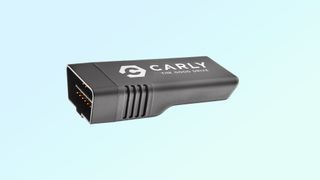 Carly OBD 2 Scanner Design
Carly OBD 2 Scanner Design
4.6 Innova Carscan Mobile 1000: An Innovative Bluetooth Option
The Innova CarScan Mobile 1000 is an innovative Bluetooth OBD-II scanner that offers predictive diagnosis and a simple setup process, making it an impressive wireless option.
4.6.1 Key Features Of The Innova Carscan Mobile 1000
- Predictive diagnosis
- Wireless connectivity
- Easy setup
4.6.2 Pros and Cons of the Innova Carscan Mobile 1000
Pros:
- Innovative features
- Simple to use
- Wireless convenience
Cons:
- Performance may vary
- Limited advanced features
4.7 Thinkcar Thinkdiag Tkd01: Robust Bluetooth Scanner
The ThinkCar ThinkDiag TKD01 is a robust Bluetooth OBD-II scanner with manufacturer-specific error codes and extended fault codes that can fix minor errors. A subscription is required after the first year.
4.7.1 Key Features Of The Thinkcar Thinkdiag Tkd01
- Manufacturer-specific error codes
- Extended fault codes
- Durable design
4.7.2 Pros and Cons of the Thinkcar Thinkdiag Tkd01
Pros:
- Extensive error code coverage
- Can fix minor errors
- Durable construction
Cons:
- Large size
- Subscription required after the first year
4.8 Autel Autolink Al539: Best For Electrical Diagnostics
The Autel AutoLink AL539 is designed for diagnosing electrical problems, featuring a built-in multimeter. It offers a wide range of live data and pre-inspection readiness checks.
4.8.1 Key Features Of The Autel Autolink Al539
- Built-in multimeter
- Extensive live data
- Pre-inspection readiness checks
4.8.2 Pros and Cons of the Autel Autolink Al539
Pros:
- Excellent for electrical diagnostics
- Comprehensive live data
- Useful pre-inspection checks
Cons:
- May not be as versatile for other issues
- Can be complex for beginners
5. How Do You Choose The Best OBD2 Scanner For Your Needs?
Choosing the best OBD2 scanner depends on your specific needs and budget. Consider the following factors:
5.1 Determine Your Budget
OBD2 scanners range in price from under $50 to over $1,000. Determine how much you are willing to spend based on your needs and usage frequency.
5.2 Identify Your Needs
Are you a DIY car owner looking for basic diagnostics, or a professional mechanic needing advanced features? Identify your needs to narrow down your options.
5.3 Read Reviews And Comparisons
Research different models and read reviews from other users. This will provide valuable insights into the performance and reliability of various scanners.
5.4 Consider Long-Term Costs
Some scanners require subscription fees for software updates or advanced features. Consider these long-term costs when making your decision.
5.5 Evaluate Ease Of Use
Choose a scanner that is easy to use and has an intuitive interface. This is particularly important if you are not a professional mechanic.
6. How Do OBD2 Scanners Work?
OBD2 scanners work by connecting to your vehicle’s onboard computer system and retrieving diagnostic trouble codes (DTCs). These codes indicate potential issues with various systems, such as the engine, transmission, and emissions.
6.1 Connecting The Scanner To Your Vehicle
Locate the OBD2 port in your vehicle, typically found under the dashboard on the driver’s side. Plug the scanner into the port and turn on the ignition.
6.2 Reading And Interpreting Diagnostic Codes
The scanner will display any stored diagnostic codes. Use the scanner’s interface or a connected device (such as a smartphone or tablet) to view the code descriptions.
6.3 Understanding Live Data Streams
Many scanners offer live data streaming, which allows you to monitor real-time performance metrics. This data can help you diagnose intermittent issues and optimize vehicle performance.
6.4 Clearing Diagnostic Codes
Once you have identified and resolved the issue, you can use the scanner to clear the diagnostic codes. This will turn off the check engine light and reset the system.
7. What Are Diagnostic Trouble Codes (Dtcs) And What Do They Mean?
Diagnostic Trouble Codes (DTCs) are alphanumeric codes that indicate specific issues with your vehicle’s systems. Understanding these codes is essential for effective diagnostics and repairs.
7.1 Standardized Vs. Manufacturer-Specific Codes
- Standardized Codes: These codes are the same across different makes and models of vehicles. They typically indicate common issues with the engine, transmission, and emissions systems.
- Manufacturer-Specific Codes: These codes are unique to specific car manufacturers. They often relate to more complex or specialized issues with the vehicle.
7.2 Decoding Common Dtcs
DTCs consist of five characters: a letter followed by four numbers. The letter indicates the system affected:
- P: Powertrain (engine, transmission)
- B: Body (interior, exterior)
- C: Chassis (brakes, suspension)
- U: Network (communication systems)
The first number indicates whether the code is generic (0) or manufacturer-specific (1). The remaining three characters provide more specific information about the issue.
7.3 Using Dtc Lookup Resources
Several online resources and mobile apps can help you look up DTCs and find detailed explanations of what they mean. These resources can be invaluable for DIY car owners and professional mechanics alike.
8. How Do You Maintain And Update Your OBD2 Scanner?
Proper maintenance and regular updates are essential for ensuring your OBD2 scanner continues to provide accurate and reliable diagnostics.
8.1 Keeping Your Scanner Clean And Dry
Clean your scanner regularly with a soft, dry cloth. Avoid using harsh chemicals or solvents, which can damage the device.
8.2 Storing Your Scanner Properly
Store your scanner in a cool, dry place away from direct sunlight and extreme temperatures. This will help prevent damage to the device’s internal components.
8.3 Updating The Software Regularly
Check for software updates regularly and install them as soon as they become available. These updates often include support for new vehicle models, diagnostic codes, and improved functionality.
8.4 Checking For Firmware Updates
In addition to software updates, check for firmware updates. Firmware updates can improve the performance and stability of your scanner.
9. What Are Some Common Mistakes To Avoid When Using An OBD2 Scanner?
Using an OBD2 scanner effectively requires careful attention to detail and a clear understanding of the device’s capabilities. Here are some common mistakes to avoid:
9.1 Ignoring Vehicle Compatibility
Before using an OBD2 scanner, always ensure it is compatible with your vehicle’s make, model, and year. Using an incompatible scanner can lead to inaccurate readings or damage to the vehicle’s computer system.
9.2 Misinterpreting Diagnostic Codes
Diagnostic codes provide valuable information, but it is essential to interpret them correctly. Always refer to reliable resources and repair manuals to understand the meaning of each code.
9.3 Neglecting Live Data Analysis
Live data streams can provide valuable insights into your vehicle’s performance. Neglecting to analyze this data can lead to missed opportunities for diagnosing intermittent issues and optimizing performance.
9.4 Failing To Update The Scanner
Regular software updates are essential for ensuring your OBD2 scanner remains accurate and reliable. Failing to update the scanner can lead to outdated diagnostic codes and inaccurate readings.
9.5 Overlooking Basic Maintenance
Basic maintenance tasks such as cleaning the scanner and storing it properly are essential for prolonging its lifespan and ensuring its continued performance. Overlooking these tasks can lead to premature wear and tear or damage.
10. Frequently Asked Questions (Faqs) About OBD2 Scanners
Here are some frequently asked questions about OBD2 scanners:
10.1 What Is An OBD-II Scanner?
An OBD-II scanner is a diagnostic tool that connects to a vehicle’s onboard computer to read error codes and monitor performance data.
10.2 What Is The OBD-II Port?
The OBD-II (On-Board Diagnostics Version Two) port is the standard port on almost all passenger vehicles sold in the United States since 1996, in Canada since 1998, in the European Union since 2004, and in Australia, Mexico and New Zealand since 2006.
10.3 What Is A DTC?
DTC stands for Diagnostic Trouble Code, which is the error code a car’s OBD system generates when it spots an issue. These are the codes read by OBD-II scanners that allow the user to figure out what’s going on under the hood.
10.4 What Do Dtcs Actually Mean?
DTCs are alphanumeric codes that provide specific information about the issue detected by the vehicle’s onboard computer. The codes can be generic, applying to all vehicles, or manufacturer-specific, providing more detailed information.
10.5 Can An OBD2 Scanner Clear Check Engine Lights?
Yes, an OBD2 scanner can clear check engine lights by resetting the diagnostic codes. However, it’s important to address the underlying issue before clearing the code to prevent it from reappearing.
10.6 Are All OBD2 Scanners Compatible With All Vehicles?
While most OBD2 scanners are compatible with vehicles manufactured after 1996, it’s essential to check the scanner’s compatibility list to ensure it supports your vehicle’s make, model, and year.
10.7 Do I Need A Professional Mechanic To Use An OBD2 Scanner?
No, you don’t need to be a professional mechanic to use an OBD2 scanner. Many scanners are designed for DIY car owners and have user-friendly interfaces and detailed instructions.
10.8 How Often Should I Use An OBD2 Scanner?
You should use an OBD2 scanner whenever you notice a warning light or suspect an issue with your vehicle’s performance. Regular scans can help you identify potential problems early and prevent costly repairs.
10.9 Can An OBD2 Scanner Improve Fuel Efficiency?
Yes, by identifying and resolving issues that affect your vehicle’s engine performance, an OBD2 scanner can help improve fuel efficiency.
10.10 Where Can I Buy A Reliable OBD2 Scanner?
You can buy reliable OBD2 scanners from auto parts stores, online retailers, and specialized diagnostic tool suppliers. Be sure to choose a reputable brand and read reviews before making a purchase. You can also contact us at CAR-TOOL.EDU.VN for recommendations.
Conclusion
Selecting the best OBD2 scanner involves understanding your needs, researching different models, and considering long-term costs. With the right scanner, you can save money on diagnostic fees, identify potential issues early, and improve your vehicle’s performance.
Ready to take control of your vehicle’s diagnostics? Contact CAR-TOOL.EDU.VN today for expert advice on selecting the right OBD2 scanner and a wide range of automotive tools. Reach us via Whatsapp at +1 (641) 206-8880 or visit our website at CAR-TOOL.EDU.VN. Our location is 456 Elm Street, Dallas, TX 75201, United States. Discover the future of automotive diagnostics with us and enhance your vehicle maintenance experience.
For further reading and research, consider these resources:
- National Institute for Automotive Service Excellence (ASE)
- Society of Automotive Engineers (SAE)
- Online DTC lookup databases
By staying informed and investing in the right tools, you can keep your vehicle running smoothly and efficiently for years to come.